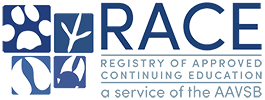
Comprehensive Bovine Embryo Transfer Training Course
Course Info
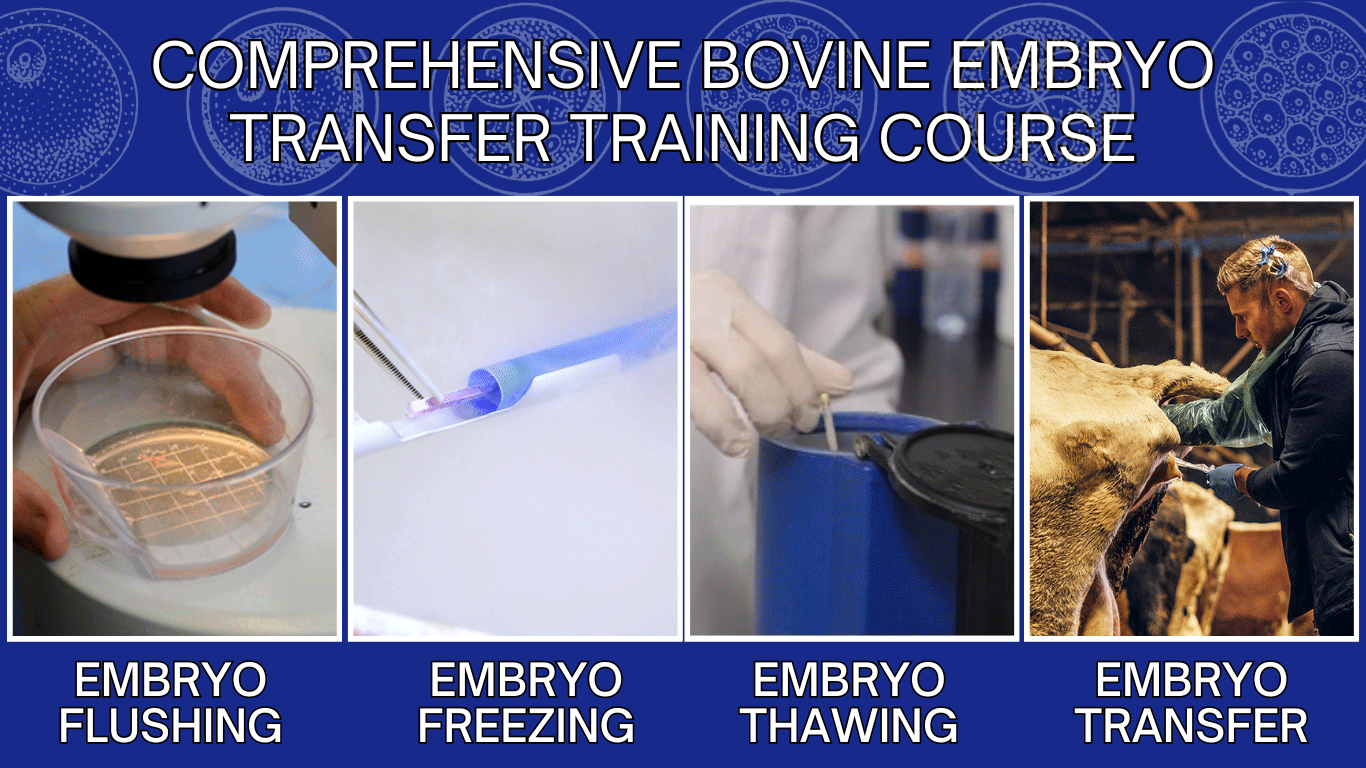
4.5 Days | 50 Contact Hours | Hands-On, Live-Animal Training | RACE-Approved
Our 4.5-day (50 hour) Comprehensive Bovine Embryo Transfer Training Course is a fully immersive, hands-on experience designed for beef and dairy producers who want to perform embryo transfer on their own cattle and veterinarians looking to add embryo transfer services to their practice. This course blends focused classroom instruction with extensive practical training, including practice using cow models and reproductive tracts, full laboratory setup with live embryos, and real-time embryo transfer and flushing in live cattle. From day one, students work through the entire conventional embryo transfer protocol using commercial-standard equipment and techniques.
By the end of the week, participants will have hands-on experience in palpation, CL identification, flush catheter placement, donor flushing, embryo searching and grading, embryo freezing and thawing, and embryo transfer. You’ll be exposed to all embryo stages commonly encountered in a commercial ET program and leave with the confidence, efficiency, and practical skill set needed to independently schedule and perform traditional embryo transfer procedures.
Certificates of Completion are given to students who complete the course and demonstrate an understanding of the theory & practical techniques of Bovine Embryo Transfer (ET).
What You Will Learn in the ET course:
- Conventional flushing
- How to search, manipulate and classify embryos.
- Procedure for loading embryos into straws for freezing or transfer.
- How to recognize cryoprotectant in order to know proper embryo thawing procedure.
- How to properly freeze bovine embryos.
- How to locate and identify ovarian anatomy.
- How to transfer bovine embryos.
- Recipient management before and after transfer.
- How to setup donor and recipient schedules.
- Methods of estrous synchronization and superovulation protocols.
- Proper completion of embryo transfer paperwork and documentation using International Embryo Technology Society guidelines.
- We also show you where to purchase all the supplies and equipment that will be needed to successfully perform embryo transfer.
Prerequisite: Students must already be competent in artificial insemination (AI) techniques. For those students who need training in AI we offer a Combined AI & ET Training Course. The AI training portion is a 1.5 day school held the two days prior to the embryo transfer school. Then the student continues practicing AI for 5 days while learning the embryo transfer methods.
Attention Veterinarians: The Comprehensive Bovine Embryo Transfer Course is RACE-Approved for 50 Hours of Continuing Education for Veterinarians and Veterinary Technicians in Jurisdictions Which Recognize the American Association of Veterinary State Boards RACE Approval.
Class Size:
Limited to 8 students maximum, 5 minimum
Class size is intentionally limited to ensure personalized instruction, maximum hands-on time, and direct instructor feedback.
Instructor
Key Benefits of Embryo Transfer
- To produce more calves from a valuable cow. Donors average between 7-8 usable embryos per flush (range 0-52 in our experience). The average donor can be superovulated successfully up to 6 times per year although there is considerable variation between donors. Pregnancy rates should average 60% in beef, and 70% in dairy cattle.
- Changing from grade cattle to pure-bred animals is less expensive using embryo transfer than buying pure-bred cattle.
- Circumvention of some types of infertility can be accomplished using embryo transfer techniques.
- More calves are produced per dose of semen. Three doses of semen are sufficient per superovulation, which will produce an average of 3.5 calves from fertile donors.
- Prevent disease transmission
- Research tool
- Embryos are a safe and efficient method of exporting and importing genetic material.
- Testing for undesirable recessive traits in the dam.
- To obtain bull calves from top cows for young sire programs which identify the best bulls.
Course Syllabus
Each day of the Comprehensive Embryo Transfer Course consists of lectures, labs, and chute time. Students are taught bovine artificial insemination, embryo recovery (flushing), embryo freezing, embryo thawing, and embryo transfer. Students also learn how to properly use a microscope for embryo identification, embryo handling, and embryo grading.
No successful course on embryo transfer can be given without presenting the student with freshly superovulated cows to provide ample opportunities to experience palpating superovulated ovaries. Therefore, we provide freshly superovulated cows, giving the student the opportunity to practice sufficient flushing & palpation. Frozen-thawed embryos are available for additional practice whenever needed.
Subjects Taught:
- All techniques needed to perform conventional embryo collection and transfer
- Adequate chute and lab time throughout the course
- Selection of donors & recipients-genetic & physical aspects
- Management and nutrition of donors
- Reproductive physiology
- Synchronization of donors and recipients
- Synchronisation of estrus using prostaglandins, progesterones & GnRH
- Superovulation-use of follicle stimulating hormones, mechanisms of follicular maturation, ablation & ovulation
- Heat detection methods
- Breeding strategies and techniques
- Methods of embryo & egg recovery
- Techniques of transferring embryos-palpation of cervix, uterus, ovaries, follicles & corpora lutea
- How to load embryos in straws for fresh transfers
- Description, preparation & care of stereozoom microscopes
- Location, manipulation & classifiaction of embryos
- How to identify which cryoprotectant was used to freeze the embryo so you can thaw it properly
- How to properly freeze and thaw embryos
- Sanitation of embryos for domestic use & for export
- Preparation of frozen-thawed embryos for transfer
- Embryo Transfer Lab setup
- Record keeping
- learn of all equipment and supplies needed to perform ET
- Embryo Transfer Textbook included
Days 1-3:
In the Morning Session students are in the classroom
- lectures and PowerPoint presentations covering all aspects of embryo transfer protocols and techniques.
- Students practice flushing on cow reproductive tracts
- Searching, manipulating, and grading embryos using stereozoom microscope
- How to load embryos in straws for fresh transfers
- How to identify which cryoprotectant was used to freeze the embryo so you can thaw it properly
- Practice freezing and thawing embryos
- Methods of estrous synchronization and superovulation, frozen transfers and protocols
- How to setup donor and recipient schedules
In the Afternoon Session students are out at the chutes practicing on live cows
- Passing ET guns
- Palpating ovaries to find active CLs and identify follicular cysts.
- Catheter placement
- Flushing
Day 4:
In the Morning Session students are in the classroom
- Lecture
- Practice flushing on cow reproductive tracts
- Practice Embryo handling
- Practice Embryo freezing
In the Afternoon Session students are out at the chutes practicing on live cows
- Students flush super-ovulated cows to collect embryos and then freeze the embryos collected.
Day 5:
- This is a review day, the students choose what they want to work on.
- A lot of practice tips!
Note: All students will be at different levels of experience, there are two chutes for everyone to be able to work on whatever they would like, along with reproductive tracts and models in the classroom. While we have a schedule, the school is focused on giving every student the needed practice they require. Throughout the week students will be able to choose what they would like to focus on and practice during the time at the chutes.
Course Hours
The Comprehensive Embryo Transfer Course is a 4.5 day school.
Days 1-4 Class starts at 8:00 A.M. and finishes at 6:30 P.M.
On Day 5 class starts at 8:00 A.M and finishes at 12:00 P.M. (NOTE: veterinarians needing 50 hrs CE for the course finish at 6:30 P.M. on day 5).
Prerequisites
Competence in AI (artificial insemination) is required. For those students who need training in AI we offer a combined AI & ET training course. The AI training portion is a 1.5 day school held the two days prior to the embryo transfer school. Then the student continues practicing AI for 5 days while learning the embryo transfer methods.
School Location
Our facilities are located in Senatobia Mississippi, just 45 minutes drive from Memphis International Airport. Students flying in to attend our school will need to fly into Memphis International Airport.
View Larger Map
Transportation & Lodging Info
Transportation & Lodging are not included in the cost of the course. If you are flying you will need to fly into Memphis International Airport and rent a vehicle. The training facility is located 35 minutes from the airport. Most students choose to stay in Senatobia or Hernando. However, you may also wish to stay at one of the casinos in Tunica, MS. The closest casinos are the Gold Strike and Horseshoe Casinos, they are located approximately 35 minutes from the school facilities.
Hotels in Senatobia, MS (10 min from training facility)
- Holiday Inn Express (mention you are attending the school for a discounted rate of $129 per night)
Phone:662-612-2550 - Spahn House – (around $125 per night)
Phone:662-288-6851 - Private Lodging – Located across the street from the training facility (around $85 per night)
Phone:662-501-4438 (ask for Terri)
Hotels in Hernando, MS (20 min from training facility)
- Super 8 – (around $85 per night)
Phone:662-429-5334
Hotels in Tunica, MS (35 min from training facility)
- Gold Strike Casino – (startng at $55 per night during the week)
Phone:888-245-7829 - Horseshoe Casino – (startng at $55 per night during the week)
Phone:800-303-7463
Course Schedule
The following is a current list of scheduled course dates:
| 2/24/2026 - 2/28/2026 FULL | 3/24/2026 - 3/28/2026 FULL |
| 4/21/2026 - 4/25/2026 FULL | 5/18/2026 - 5/22/2026 |
| 6/22/2026 - 6/26/2026 | 7/27/2026 - 7/31/2026 |
Tuition
Tuition for the Comprehensive Embryo Transfer Course is: $3,650.00 US Dollars
(Required Deposit: $1,500)
We accept the following forms of payment:

Registration
To register for this course click the below Register button.
Testimonials
"I found the embryo transfer course to be exactly what I needed and more than I expected. Through veterinary school, I did not get enough actual hands-on learning with advanced reproduction procedures. Being taught in a small class setting was an ideal learning environment, I gained the tactical skills and knowledge needed to successfully and confidently flush cattle for myself and future clients. I would recommend the class to anyone ready to take their veterinary practice or cattle program to the next level - it was well worth my money and my time."
Stanley Soehnlen DVM
Soehnlen Cattle Company
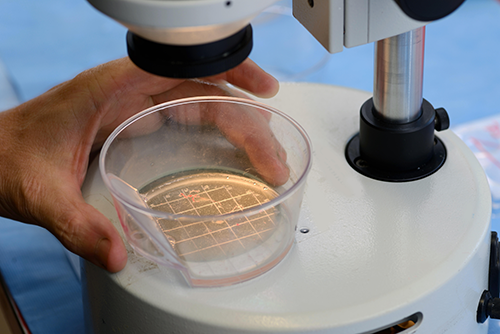
"The embryo transfer class I took was very informative and hands on. There was a good balance of classroom and cattle handling. I learned a lot! I honestly feel I can work my whole herd by myself after this class."
Charles Godsy
Godsy Farms
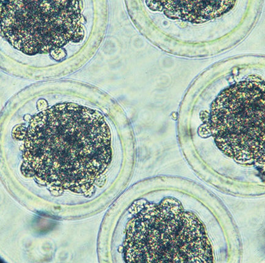
“Had a great experience, a lot of hands-on training in the lab, and with cattle as well. The staff are great people would recommend to anyone who wants to learn E.T.”
Stephanie Vasquez
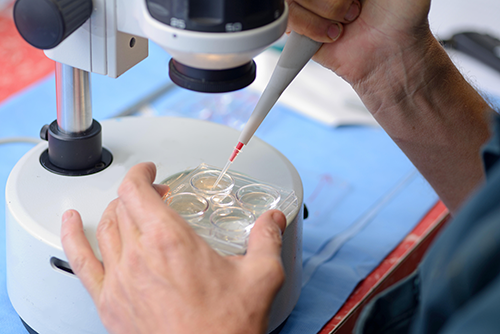
"I just wanted to say I think the tuition for your class was the best money I've ever spent for continuing education. I really appreciated the way things were presented. They left no grey areas about which methods and techniques were best."
Bruce l. Chambers DVM
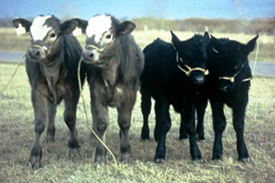
"I just wanted to tell you thank you for offering such a great class, this has been a wonderful opportunity for me. Yesterday I saw my first embryo calf born and another is on the way."
Cheri Kraus
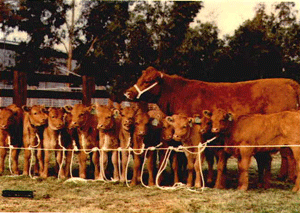
"Just wanted to let you know how valuable your course has been for me. The presentation of information and techniques was great! Being able to perform embryo transfer has added much value to my practice."
Jan Michler DVM
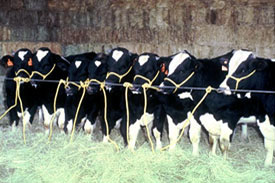
"My time was well spent at The International Embryo Technology School, it was one of the best things I have ever done to date. Thus taking the course has given me a great advantage in the purebred cattle industry and an awesome outlook in the business world."
Rodney Hollman
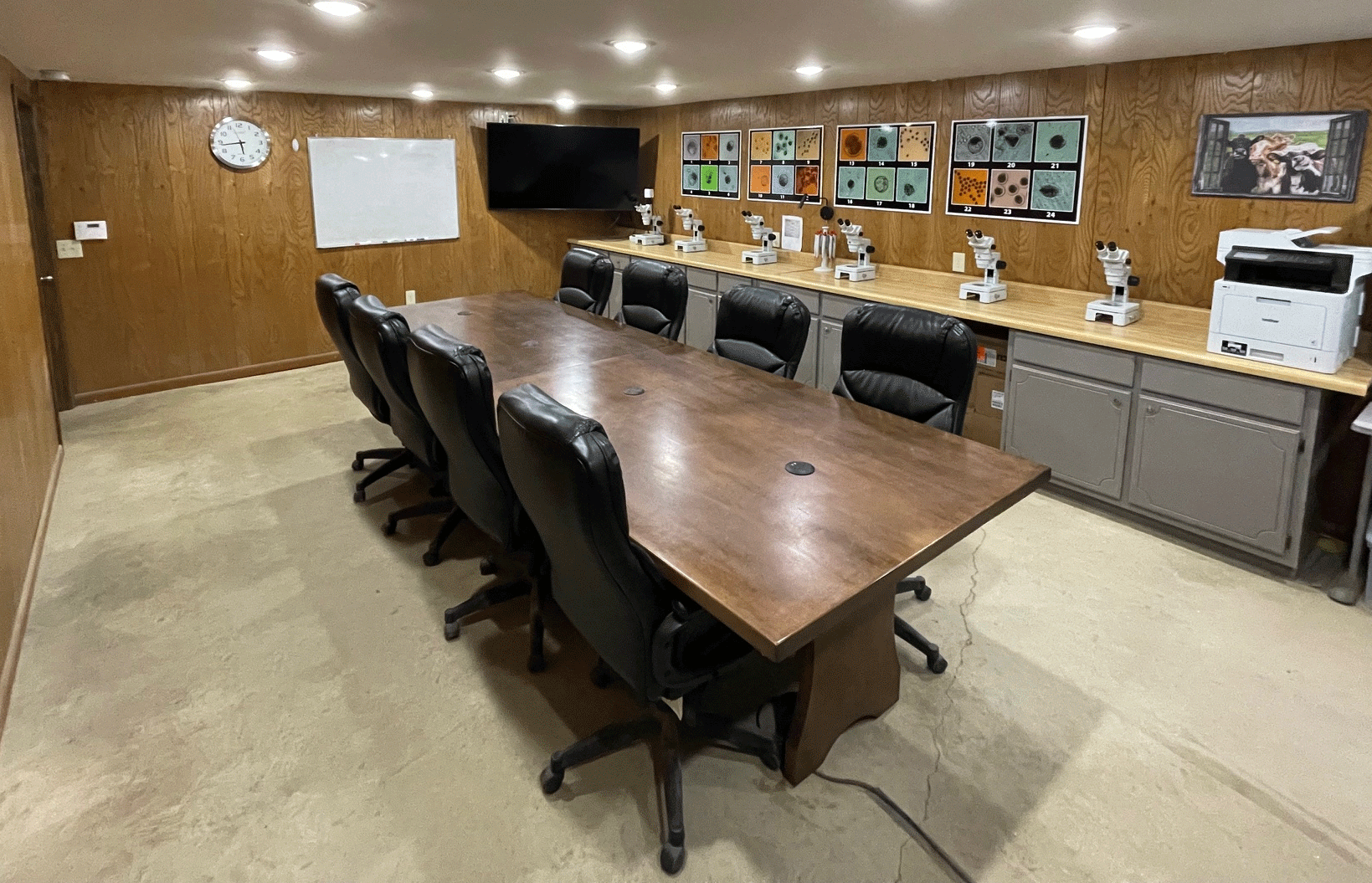
"This was one of the best CE courses I have ever taken in over 20 years of practice. Dale Whitaker is a natural teacher and his experience in the cattle industry has given him a unique and valuable perspective you don’t get everywhere. He is very knowledgeable about bovine reproduction and ET in particular. It was just the right mix of class lecture, discussion and hands on cattle work. It was a great week and well worth the cost and time in my opinion."
Tom Hancock DVM
Decatur, AR
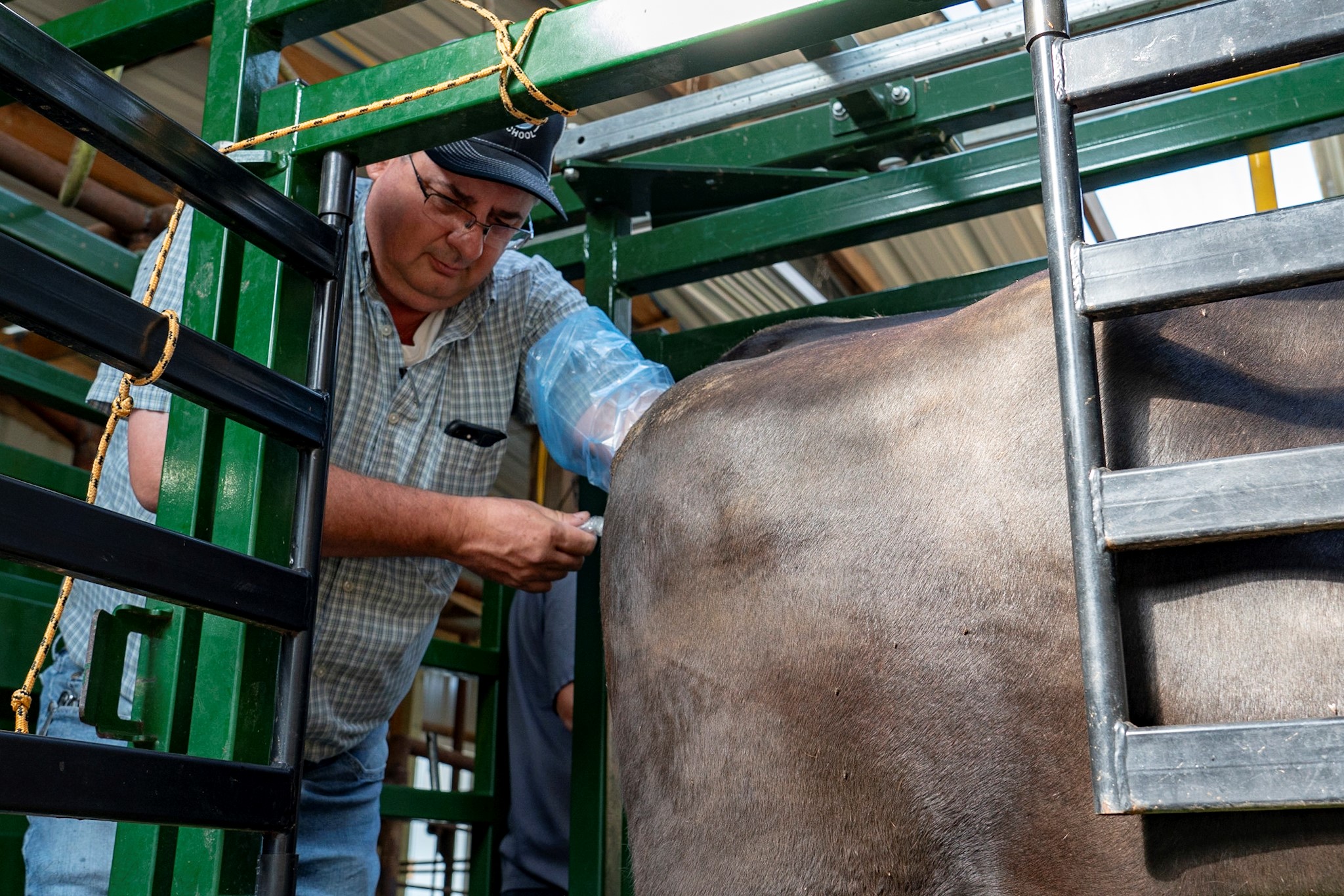
"I didn’t really plan to attend the entire ET program and was only looking to thaw and implant, but I’m glad I did. I feel a lot more comfortable in the technology and it gives me an infinitely greater understanding of the process to make the best embryos possible. I enjoyed the entire program, Dale was great and really taught you rather than just delivering information. He also has the right personality for teaching diverse groups. Thank you for a great experience. "
Christopher Selby
New Lebanon, OH
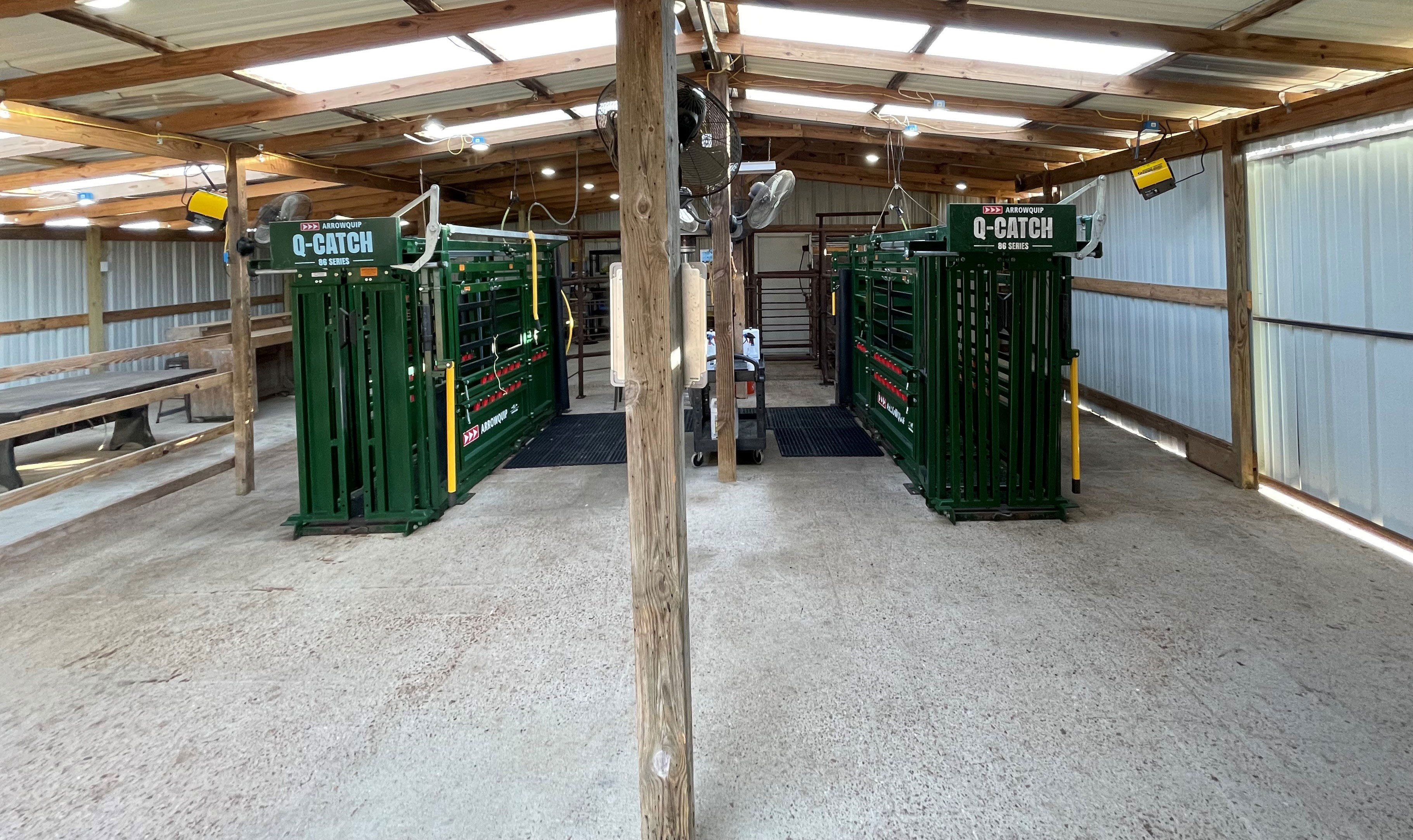

|
|
|
